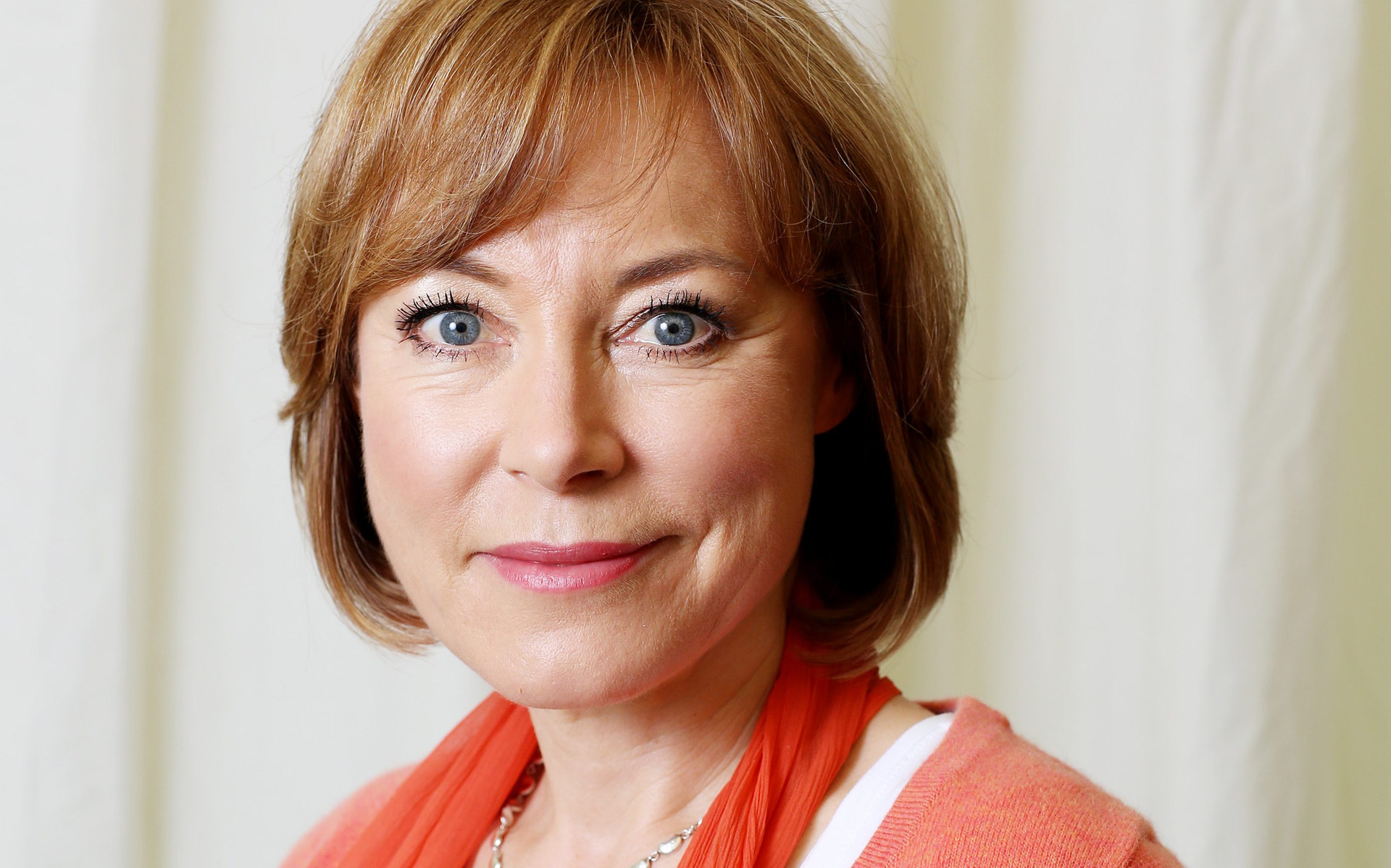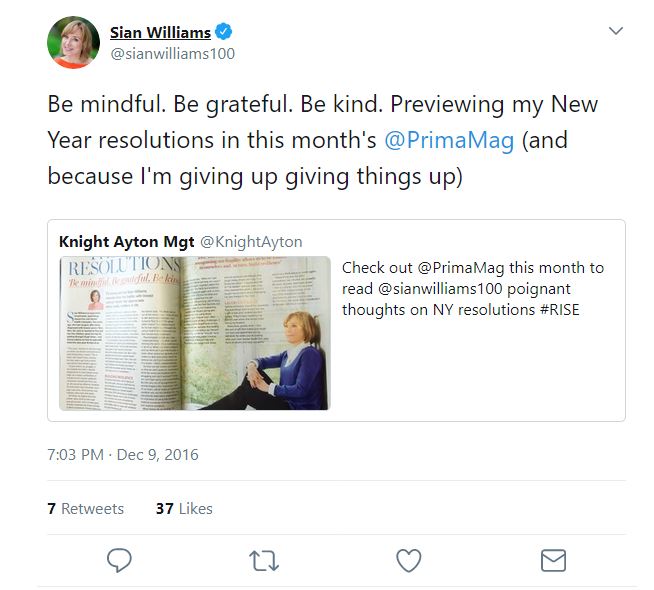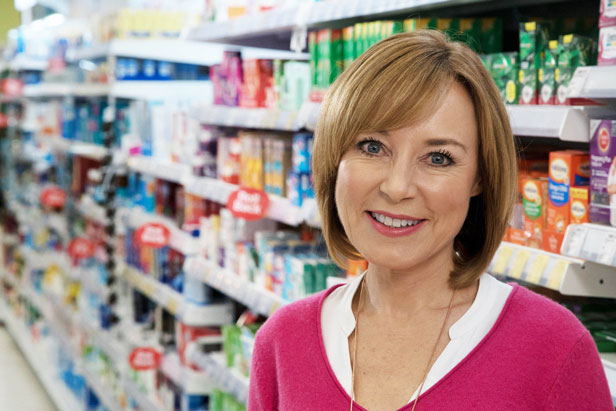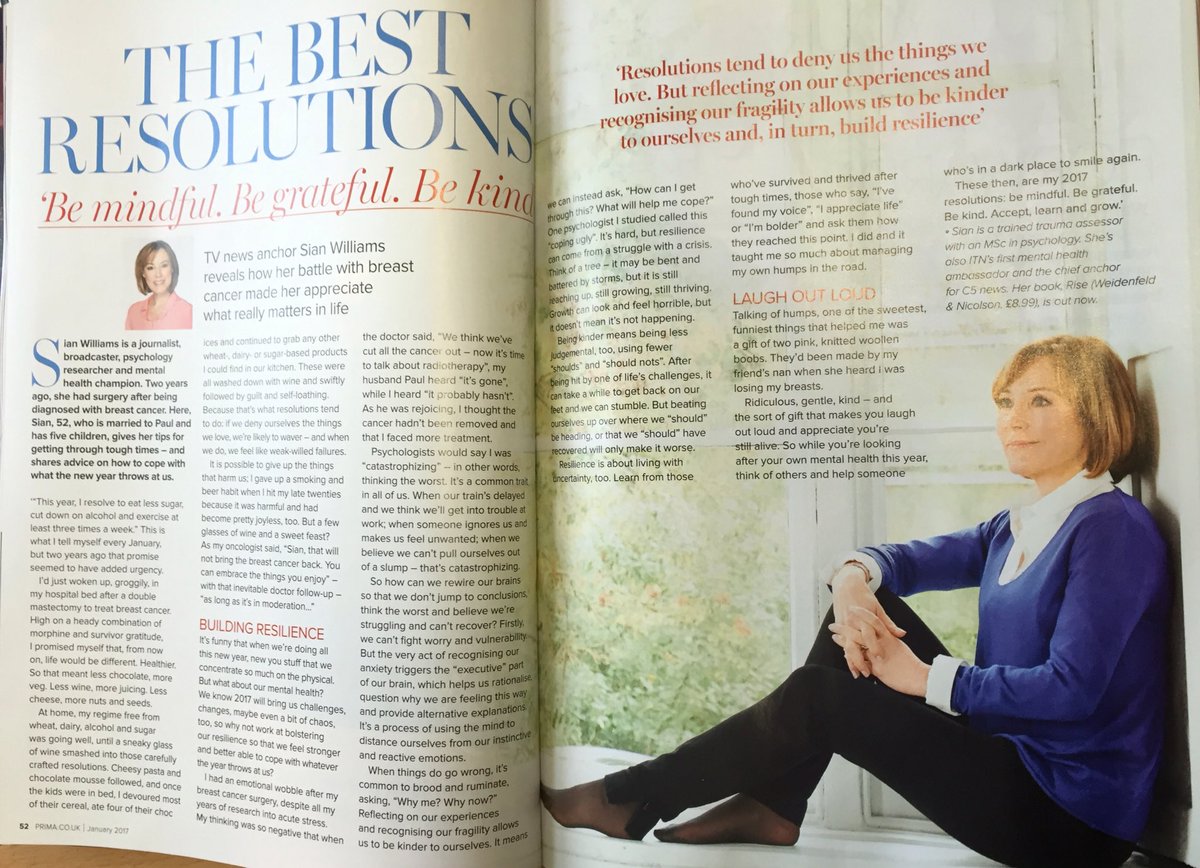TV News Anchor Sian Williams Reveals how her life change
Resolutions tend to deny us the things we love. But reflecting on our experiences and recognising our fragility allows us to be kinder to ourselves and, in turn, build resilience. TV news anchor Sian Williams reveals how her battle with breast cancer made her appreciate what really matters in life
The Best Resolution:
“Be Mindful. Be Grateful. Be Kind.
TV news anchor Sian Williams reveals how her battle with breast cancer made her appreciate what really matters in life.
Sian Williams is a journalist, broadcaster, psychology researcher and mental health champion. Two years ago, she had surgery after being diagnosed with breast cancer. Here, Sian, 52, who is married to Paul and has five children, gives her tips for getting through tough times – and shares advice on how to cope with what the new year throws at us.
“This year, I resolve to eat less sugar, cut down on alcohol and exercise at least three times a week.” This is what I tell myself every January, but two years ago that promise seemed to have added urgency.
I’d just woke up, groggily, in my hospital bed after a double mastectomy to treat breast cancer. High on a heady combination of morphine and survivor gratitude, I promised myself that, from now on, life would be different. Healthier. So that meant less chocolate, more veg. Less wine, more juicing. Less cheese, more nuts and seeds.
At home, my regime free from wheat, diary, alcohol and sugar of wine smashed into those carefully crafted resolutions. Cheesy pasta and chocolate mousse followed, and once the kids were in bed, I devoured most of their cereal, ate four of their choc ices and continued to grab any other wheat, diary or sugar based products. I could find in our kitchen. These were all washed down with wine and swiftly followed by guilt and self-loathing. Because that’s what resolutions tend to do: if we deny ourselves the things we love, we are likely to waver – and when we do, we feel like weak-willed failures.
It is possible to give up the things that harm us; I gave up a smoking and beer habit when I hit my late twenties because it was harmful and had become pretty joyless, too. But a few glasses of wine and a sweet feast? As my oncologist said, “Sian, that will not bring the breast cancer back. You can embrace the things you enjoy” – with that inevitable doctor follow-up – “as long as it’s in moderation...”
“Resolutions tend to deny us the things we love. But reflecting on our experiences and recognising our fragility allows us to be kinder to ourselves and, in turn build resilience.”
BUILDING RESILIENCE:
It’s funny that when we’re doing all this new year, new you stuff that we concentrate so much on the physical. But what about our mental health? We know 2017 will bring us challenges, changes, maybe even a bit of chaos, too, so why not work at bolstering our resilience so that we feel stronger and better able to cope with whatever the year throws at us?
I had an emotional wobble after my breast cancer surgery, despite all my years of research into acute stress. My thinking was so negative that when the doctor said, “we think we’ve cut all the cancer out – now it’s time to talk about radiotherapy”, my husband Paul heard “It’s gone”, while I heard “it probably hasn’t”. As he was rejoicing, I thought the cancer hadn’t been removed and that I faced more treatment.
Psychologists would say I was “catastrophizing” – in other words, thinking the worst. It’s a common trait in all of us. When our train’s delayed and we think we’ll get into trouble at work; when someone ignores us and makes us feel unwanted; when we believe we can’t pull ourselves out of a slump – that’s catastrophizing.
So how can we rewire our brains so that we don’t jump to conclusions, think the worst and believe we’re struggling and can’t recover? Firstly we can’t fight worry and vulnerability. But the very act of recognising our anxiety triggers the “executive” part of our brain, which helps us rationalise question why we are feeling this way and provide alternative explanations. It’s a process of using the mid to distance ourselves from our instinctive and reactive emotions.
When things do go wrong, it’s common to brood and ruminate, asking, “Whey me? Why now?” Reflecting on our experiences and recognising our fragility allows us to be kinder to ourselves. It means we can instead ask, “How can I get through this? What will help me cope?” One psychologist I studied called this “coping ugly”. It’s hard, but resilience can come from a struggle with a crisis. Think of a tree – it may be bent and battered by storms, but it is still reaching up, still growing, still thriving. Growth can look and feel horrible, but it doesn’t mean it’s not happening.
Being kinder means being less judgemental, too, using fewer “should” and “should nots”. After being hit by one of life’s challenges, it can take a while to get back on our feet and we can stumble. But beating ourselves up over where we “should” be heading, or that we “should” have recovered will only make it worse.
Resilience is about living with uncertainty, too. Learn from those who’ve survived and thrived after tough times, those who say, “I’ve found my voice”, “I appreciate life” or “I’m bolder” and ask them how they reached this point. I did and it taught me so much about managing my own humps in the road.
LAUGH OUT LOUD:
Talking of humps, one of the sweetest, funniest things that helped me was a gift of two pink, knitted woollen boobs. They’d been made by my friend’s nan when she heard I was losing my breasts.
Ridiculous, gentle, kind – and the sort of gift that makes you laugh out loud and appreciate you’re still alive. So while you’re looking after your own mental health this year, think of others and help someone who’s in a dark place to smile again.
These then, are my 2017 resolutions: be mindful. Be grateful. Be Kind. Accept, learn and grow.”
- Sian is a trained trauma assessor with an MSc in Psychology. She’s also ITN’s first mental health ambassador and the chief anchor for C5 news. He book, Rise (Weidenfeld & Nicolson, £8.99), is out now.
Source: Life lessons | Page 52-53 | Prima.co.uk | January 2017
<<<<<<<<<<<<<<<......................>>>>>>>>>>>>>>>>>>
Telegraph News
Sian Williams: Teach 'self-absorbed' children to be resilient
Sian Williams presents 5 News Credit: Clara Molden | Patrick Foster, Media Correspondent
4 June 2016 • 8:00pm
Children have become “obsessed with how they are perceived” and should be given lessons in how to become emotionally resilient, former BBC presenter Sian Williams has claimed.
Williams, who is a qualified trauma psychologist, revealed last week that she has had a double mastectomy after suffering from breast cancer.
Appearing at the Hay Festival, sponsored by the Telegraph, the presenter said that “self-absorbed” children should be taught “taught how to manage their emotions safely and effectively”.
The journalist, who is currently the main anchor on Channel 5 news, said: “The problem I think with children at the moment is this idea of self absorption. It’s the risk averse, the being obsessed with how they are perceived, social media, seeing perfect life reflected back to them. The feeling of ‘I don’t have that, why don’t I have that?’, and feeling upset about that.
Williams said she had visited schools and seen “resilience classes” being taught to young teenagers. She said: “I think schools getting involved in having these resilience classes, they do some mindfulness, talk about their emotions. Put themselves in others’ shoes and show compassion, that really helps, but we simply do not do enough of it. We need to develop resilient children.”
The journalist was speaking to promote her new book, Rise: Surviving and Thriving After Trauma, which includes an account of her recovery from breast cancer, after being diagnosed in 2014.
XXXXXXXXXXXXXXXXXXXXXXXXXXXXXXXXXXXXXXXX#
http://home.bt.com/lifestyle/health/wellness/sian-williams-breast-cancer-battle-dieting-feeling-fabulous-at-50-11364141651848
Sian Williams on cancer and feeling fabulous in her 50s: ‘Life couldn’t be better’
Journalist and TV presenter Sian Williams battled breast cancer two years ago. The mother-of-four tells us how the experience has changed her outlook on life and health.
By Gabrielle Fagan | Last updated: 26 January 2017, 10:16 GMT
Although Sian Williams acknowledges she's "living with uncertainty" since her battle with breast cancer two years ago, the experience has, she reveals, given her a new and more liberated perspective.
The former host of BBC Breakfast for 11 years, was diagnosed a week after her 50th birthday in 2014 and underwent a double mastectomy.
Living with uncertainty
"One of the brilliant doctors who treated me told me at the end of it all, 'You've got to live with uncertainty because there's no clear-cut path ahead,'" she explains.
"But knowing that actually made it a lot easier, because after all, we're all living with uncertainty as no one ever knows what's around the corner.
“That doctor also told me, 'You're lucky, you've got a full and healthy life, just go out, enjoy it and live it.' In the early days, I did have anxious moments thinking, 'Maybe it's back', but then you just get on with things like work and the family and realise there's no point constantly worrying."
The 52-year-old mother-of-four, who has two adult sons from a previous marriage as well as a son, Seth, 10, and daughter, Eve, seven, with her TV producer husband Paul Woolwich, has previously revealed that her biggest fear following her diagnosis was not being able to see her youngest children grow up.
"Nowadays I just feel very blessed and so fortunate that my cancer was very treatable. I'm in robust good health and all my check-ups, which I will continue to have for years, have been clear," says this down-to-earth woman who acknowledges, "it's taken work and been an effort", but she's now able to feel "very positive" about the future.
Making health a priority
Health is currently a work focus too as she's been investigating the vast array of health products available on the high street with co-host Dr Ranj Singh on ITV series Save Money: Good Health.
Health is currently a work focus too as she's been investigating the vast array of health products available on the high street.
"We spend so much money as a nation on over-the-counter remedies and supplements, because often we're looking for a quick health fix or may be reluctant to go to a doctor.
“It's about helping viewers decide if they're spending their money wisely and exploring any cheaper alternatives," says Williams, who was born in London to Welsh parents.
Her personal health battle, which she kept secret until May 2016, has made her re-focus her own approach to health and dieting. "We should all stop persecuting ourselves about what we eat. 'Diet' is a word which reeks of a punishment regime where pleasure doesn't get a look in, and that can't be good for us," she declares.
"I watched my mum on diets while I was growing up and although I'd sworn never to diet myself over the years, I started excluding quite a lot of food groups in the belief it would make me healthier.
“I've tried fasting, cutting out sugar, gluten, and paid attention to reports about wine or certain foods which have been said to raise our cancer risk. So I've been all about drinking green tea, eating salmon and running."
Being kind to your body
The presenter, who anchors 5 News on Channel Five and who lost her mother and her aunt to cancer, reflects: "It's ironic that my husband's never done any of that, and has been known to have things like a couple of doughnuts for breakfast, but I'm the one who got the cancer! Recently I've found out that it's a varied diet which keeps you healthy and if you cut out too many food groups, your gut simply doesn't like it.
"The gut's called the 'second brain' because it has such a direct influence on the way we feel and think and I'm researching foods which can give us a happy gut and healthy mind."
Nowadays she avoids imposing 'healthy' rules on herself and says: "I'm kinder to myself. I've had enough of the 'shoulds' and 'should nots' which used to define what I did and instead this year my approach is: 'I might do this or that', which I regard as far better. I've realised if you break the rules you've set yourself, the result is you feel you failed, and who needs that?"
Focus on family
The last few years have, she says, inevitably changed the way she looks at life. "You become very aware of how important the people you love are to you after [illness]... and how important it is to spend time with them," says Williams.
"I focus on looking after the family, having a happy home, and showing compassion to other people. It's about being more aware of when people need a bit more help and, hopefully, being the one who can offer it. That's become much more important to me, and my philosophy is: concentrate on the big stuff and let the small stuff go by the way."
Ageing is of little consequence to her, she says with a smile, because "my fifties have been fab for me so far and I just feel everything's all good at the moment.
“I have two mantras which are: 'Be mindful, be grateful, be kind' and one from the wonderful Winnie-the-Pooh books: 'You're braver than you believe, stronger than you seem and smarter than you think'.
“I'm healthy, I've got amazing children, and, after renting for two years, we've just moved and are making a new home in Kent, a project we've dreamt of tackling. Life couldn't be better."
Sources:
https://mobile.twitter.com/sianwilliams100/status/807299631453454336
http://www.telegraph.co.uk/news/2016/06/04/sian-williams-teach-self-absorbed-children-to-be-resilient/
http://home.bt.com/lifestyle/health/wellness/sian-williams-breast-cancer-battle-dieting-feeling-fabulous-at-50-11364141651848
Go Back to Mind Development page: Click Here

TV news anchor Sian Williams reveals how her battle with breast cancer made her appreciate what really matters in life
|

Be Mindful. Be grateful. Be kind. Previewing my New Year resolutions in this month's @PrimaMag (and because I'm giving up giving things up)
|

Resolutions tend to deny us the things we love. But reflecting on our experiences and recognising our fragility allows us to be kinder to ourselves and, in turn, build resilience.
|

The best Resolutions for New Year. Be Mindful. Be grateful. Be kind.
|